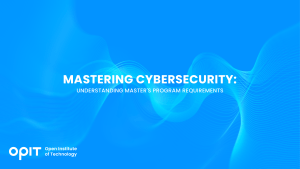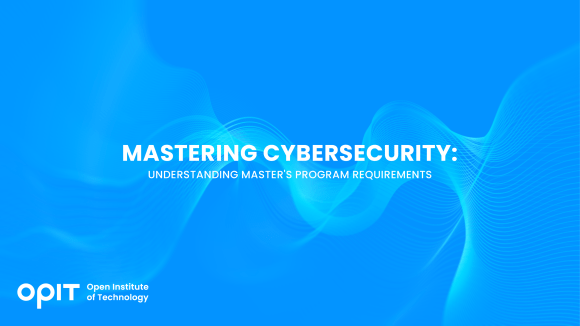

Businesses are under increasing threat from cybercriminals and malicious cyber attacks, a threat that is growing year on year. In 2023, malicious attacks cost U.S. businesses $8 trillion, and those losses are expected to climb to $9.5 trillion in 2024, a steady increase that shows no sign of slowing.
Given this state of affairs, it is no surprise to learn that professionals with a master’s in cybersecurity are in increasing demand. However, choosing the best cybersecurity master’s degree can be a daunting task. There are an increasing number of educational institutions that provide this qualification (or others like it).
However, those wishing to take their qualifications to a new level should be aware of the cybersecurity master’s requirements.
Most institutions will need the prospective student to have previous qualifications, such as a bachelor’s degree or relevant work experience. These requirements differ for each educational institution, and understanding them is key to choosing the right master’s degree in cybersecurity.
General Requirements for Cybersecurity Master’s Programs
Although the requirements to gain admission to a master’s in cybersecurity program vary by educational institution, there are some common prerequisites. These can include:
Prior Education
As mentioned, a recognized bachelor’s degree in cybersecurity is considered an essential stepping stone towards a master’s qualification. However, this is not an absolute. Many educational institutions will evaluate prospective students on a case-by-case basis, and degrees in other fields can count in the applicant’s favor. As a general rule, the student should be able to demonstrate knowledge in areas such as computer science, information technology, or a related field.
GPA Requirements
As a rule of thumb, entry into most master’s programs will require a GPA between 2.5 and 3.0. However, there are exceptions, with some schools requiring much higher grade point averages.
Program Prerequisites
Many educational institutions have stringent requirements on undergraduate courses that they require for the student for admittance to the master’s program. Knowledge of data structures, programming languages, calculus, programming, networks, and systems security concepts will definitely be advantageous.
Letters of Recommendation
Admission can also be influenced by work experience demonstrating a knowledge of softer business skills. These include communication, teamwork, mentoring, and even ethical standards. Many schools will accept letters of recommendation from business leaders, as well as a variety of other testimonials. These will certainly increase the chances of acceptance into the master’s program of your choice, irrespective of other cybersecurity master’s requirements.
Specific Skills and Experience
The importance of prior experience in the fields of IT and cybersecurity when applying for entry to a master’s degree in cybersecurity cannot be overstated. A good track record in real-world implementation is valuable, as is participation in research projects.
Paid internships can be extremely valuable when it comes to admission to the degree of your choice. These internships are also important in demonstrating a commitment to lifelong learning and can contribute to credits toward a master’s qualification.
OPIT’s Cybersecurity Master’s Program Requirements
The OPIT Master’s Degree (MSc) in Enterprise Cybersecurity has several core requirements for admission. These include prior technical experience or proven expertise. However, this requirement does not bar those who lack experience from admission. Applicants who do not have a technical background in the cybersecurity field will undergo an assessment to gauge their foundational IT and cybersecurity skills.
A passion for cybersecurity innovation in an ever-evolving threat environment is as important as prior experience when it comes to gaining entry to the OPIT master’s course. Candidates who demonstrate a commitment to continuous learning will not be hamstrung by a lack of previous working experience when it comes to gaining acceptance into the OPIT postgraduate program.
Preparing for OPIT’s Cybersecurity Master’s
Those wishing to enroll in the OPIT cybersecurity master’s program can ensure that they are prepared for any potential assessment (and the demands of the coursework) in a variety of ways.
Online courses offer a flexible, affordable, and accessible way to gain insights into the cybersecurity environment, and chat groups can provide real-world interactions that can fill any knowledge gaps. Taking part in group chats may also provide mentoring for the aspirant cybersecurity expert.
As part of a commitment to lifelong learning, staying up to date with the latest trends and developments in the cybersecurity field is essential. Subscribe to relevant newsletters and set your news alerts to flag stories about cyber threats and cybersecurity.
Why Choose OPIT for Your Cybersecurity Education?
OPIT provides a fully accredited Master’s Degree (MSc) in Enterprise Cybersecurity that emphasizes integrating theory and practical application in real-world solutions.
The affordable OPIT master’s program boasts a curriculum developed in close consultation with industry leaders and is presented by leaders in the field of cybersecurity. The program is designed to meet and exceed the requirements of some of the industry’s most innovative organizations.
The study experience is streamlined through an advanced online learning environment that is perfect for those who want to take their careers to the next level while enjoying the flexibility to set their own pace when it comes to coursework.
For professionals who want flexibility and demand only the best qualifications, this master’s degree is ideal. An OPIT master’s in cybersecurity is the key to preparing students for leadership roles in the cybersecurity sector.
A Master’s in Cybersecurity – Final Considerations
Research is the key to both successful enrolment and eventual graduation from a master’s degree in cybersecurity.
Students should be aware of cybersecurity master’s requirements before they make a final decision on a degree provider. These requirements will often include a bachelor’s degree or work experience. But soft skills also count when applications are evaluated.
By choosing an OPIT Master’s in Enterprise Cybersecurity any prospective student will enjoy peace of mind. That sense of confidence comes from knowing that the degree they have selected is respected by leading organizations in the cybersecurity field.
Related posts

Source:
- Times of Malta, published on September 18th, 2025
4 min read
The gathering brought together academics and technology leaders from prominent European Institutions, such as Instituto de Empresa (IE University), OPIT itself and the Royal College of Arts, to explore how artificial intelligence is reshaping the university experience.
The OPIT AI Copilot has been trained on the institute’s complete academic archive, a collection created over the past three years that includes 131 courses, more than 3,500 hours of recorded lectures, 7,500 study resources, 320 certified assessments, and thousands of exercises and original learning documents.
Unlike generic AI tools, the Copilot is deeply integrated with OPIT’s learning management system, allowing it to track each student’s progress and provide tailored support.
This integration means the assistant can reference relevant sources within the learning environment, adapt to the student’s stage of study, and ensure that unreleased course content remains inaccessible.
A mobile app is also scheduled for release this autumn, that will allow students to download exercise and access other tools.
During examinations, the Copilot automatically switches to what the institute calls an “anti-cheating mode”, restricting itself to general research support rather than providing direct answers.
For OPIT’s international community of 500 students from nearly 100 countries, many of whom balance studies with full-time work, the ability to access personalised assistance at any time of day is a key advantage.
“Eighty-five per cent of students are already using large language models in some way to study,” said OPIT founder and director Riccardo Ocleppo. “We wanted to go further by creating a solution tailored to our own community, reflecting the real experiences of remote learners and working professionals.”
Tool aims to cut correction time by 30%
The Copilot will also reduce administrative burdens for faculty. It can help grade assignments, generate new educational materials, and create rubrics that allow teachers to cut correction time by as much as 30 per cent.
According to OPIT, this will free up staff to dedicate more time to teaching and direct student engagement.
At the Milan event, Rector Francesco Profumo underlined the broader implications of AI in higher education. “We are in the midst of a deep transformation, where AI is no longer just a tool: it is an environment that radically changes how we learn, teach, and create,” he said.
“But it is not a shortcut. It is a cultural, ethical, and pedagogical challenge, and to meet it we must have the courage to rethink traditional models and build bridges between human and artificial intelligence.”
OPIT was joined on stage by representatives from other leading institutions, including Danielle Barrios O’Neill of the Royal College of Art, who spoke about the role of AI in art and creativity, and Francisco Machin of IE University, who discussed applications in business and management education.
OPIT student Asya Mantovani, also employed at a leading technology and consulting firm in Italy, gave a first-hand account of balancing professional life with online study.
The assistant has been in development for the past eight months, involving a team of OPIT professors, researchers, and engineers.
Ocleppo stressed that OPIT intends to make its AI innovations available beyond its own institution. “We want to put technology at the service of higher education,” he said.
“Our goal is to develop solutions not only for our own students, but also to share with global institutions eager to innovate the learning experience in a future that is approaching very quickly.”

From personalization to productivity: AI at the heart of the educational experience.
Click this link to read and download the e-book.
At its core, teaching is a simple endeavour. The experienced and learned pass on their knowledge and wisdom to new generations. Nothing has changed in that regard. What has changed is how new technologies emerge to facilitate that passing on of knowledge. The printing press, computers, the internet – all have transformed how educators teach and how students learn.
Artificial intelligence (AI) is the next game-changer in the educational space.
Specifically, AI agents have emerged as tools that utilize all of AI’s core strengths, such as data gathering and analysis, pattern identification, and information condensing. Those strengths have been refined, first into simple chatbots capable of providing answers, and now into agents capable of adapting how they learn and adjusting to the environment in which they’re placed. This adaptability, in particular, makes AI agents vital in the educational realm.
The reasons why are simple. AI agents can collect, analyse, and condense massive amounts of educational material across multiple subject areas. More importantly, they can deliver that information to students while observing how the students engage with the material presented. Those observations open the door for tweaks. An AI agent learns alongside their student. Only, the agent’s learning focuses on how it can adapt its delivery to account for a student’s strengths, weaknesses, interests, and existing knowledge.
Think of an AI agent like having a tutor – one who eschews set lesson plans in favour of an adaptive approach designed and tweaked constantly for each specific student.
In this eBook, the Open Institute of Technology (OPIT) will take you on a journey through the world of AI agents as they pertain to education. You will learn what these agents are, how they work, and what they’re capable of achieving in the educational sector. We also explore best practices and key approaches, focusing on how educators can use AI agents to the benefit of their students. Finally, we will discuss other AI tools that both complement and enhance an AI agent’s capabilities, ensuring you deliver the best possible educational experience to your students.
Have questions?
Visit our FAQ page or get in touch with us!
Write us at +39 335 576 0263
Get in touch at hello@opit.com
Talk to one of our Study Advisors
We are international
We can speak in:
